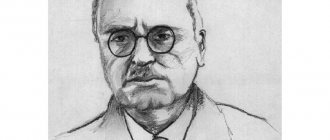In all countries of the world, it is quite a common phenomenon when, in childhood, young restless children express a sudden desire to get married or marry one of their parents. Some adults are touched by such statements from fidgets, but most mothers and fathers agree that such thoughts of a son or daughter are not normal. In psychology, this state of affairs is considered one of the manifestations of the Oedipus complex. This is why a child who shows excessive affection for a parent of the opposite sex is overly infatuated with his mother or father, and accepts the other parent as his rival. According to Freud's theory, such a child gradually develops a sexual attraction to the parent of the opposite sex. Moreover, the concept of “Oedipus complex” can be applied to children of both sexes.
General information
The Oedipus complex and the Electra complex are a disorder of psychosexual development associated with the presence in children (boys and girls, respectively) of an internal universal unconscious erotic attraction and attachment to one of the parents and jealousy of the other.
The concept was introduced into psychology by Sigmund Freud in 1897, but it is still an important component of the psychological analysis of a person. It can be assumed that “we are all Oedipus” and every child experiences a phallic stage of development and it is the problems of the Oedipus constellation that become the core of all neuroses .
History of the term
The name "Oedipus complex" is based on the story of the ancient Greek myth, which tells the story of King Oedipus, who killed his own father and married his mother. Thus, Sigmund Freud, in his correspondence with his friend Wilhelm Fliess, compared his jealousy of his father and love for his mother with the “bewitching power of Oedipus” and called this a universal phenomenon of early childhood. He put forward his assumption in a work about special types of choice of a sexual object by men, where he described that a boy who lusts after his mother and hates his father falls under the influence of the Oedipus phenomenon.
Oedipus complex in Freudian psychology and other variations
According to Freud, the Oedipus and Electra complex should be considered as a stage of psychosexual perception and development, first manifesting itself in early childhood - between 2-3 years of age. This is the so-called period of awareness by the primate of genitality (phallicity), combining the oral and anal attraction of the previous stages into a developed libido. It may be of primary importance in the formation of various neurotic deviations and sexual disorders. However, opponents of the Freudian school do not recognize the paramount importance of Oedipus disorder in human psychosexual development and the likelihood of psychosis.
Thus, according to Adler, the Oedipus complex should be perceived as a manifestation of childhood spoilage, the result of errors in education and maternal connivance, because a child who is accustomed to getting everything he wants, for example, a lot of affection and attention, develops sexually faster and believes that erotic desires are also must also be satisfied with the only source available at that time - the mother.
Erich Fromm, although he mostly agreed with Freud (data source - Wikipedia), however, proposed to consider the Oedipus stage not only in the sexual aspect, but also in a wider range of attachments. Thus, hostility towards the father can be caused by the authoritarianism of patriarchy and the possessive attitude of the parents, restricting the independence and freedoms of the child.
Otto Rank suggested that the Oedipus complex may be the result of a child's desire to preserve his individuality by pitting his parents against each other. While they, in turn, fight openly or secretly for the child’s favor, the choice usually falls on the parent who least encroaches on the child’s individuality.
In addition, Freud’s teaching does not take into account the influence of brothers and sisters in the formation of the Oedipus complex, it underestimates the weight of the mother’s influence, prohibitions and temptations, and the Electra complex in the psychology of women is not sufficiently substantiated.
Development time
Periods of development of the Oedipus complex:
- Oral – the time from 0 to 1.5 years, when the child is closely connected with the mother. His mouth is his most basic tool for experiencing the world and experiencing pleasure. The primary object of pleasure during this period is the mother's breast. Breastfeeding time becomes an inevitable and very important ritual, during which the child receives maximum positive emotions.
- The anal period is the time from 1.5 to 3 years when the child learns to defecate independently, while enjoying it. Not only from monitoring this process, but also from the encouragement of the child by the adults around him. Thus, he begins to realize his significance and the significance of his awareness. Self-control and self-awareness become a guide to a world where you can control your body.
- The phallic period from 3 to 4 is another stage in the development of sexuality in a child. At this time, a person begins to recognize himself as an individual of a certain gender. Looking at the genitals, playing with them, comparing them with others is an integral part of the phallic period of personality development, which has as its main task the determination of gender.
- Phallic-Oedipal period. Just at the age of 4-6 years, for the first time, a boy begins to desire his mother from a sexual point of view and be jealous of her father. As a representative of the female set of chromosomes, the girl discovers in herself envy of the owners of the penis, after some time expressing her love exclusively for her father, ignoring her mother.
- The latent period is the age from 6 to 12 years, characterized by a temporary absence and extinction of sexual desires. The entire development of the child at this moment is aimed at communication, the educational process, and the establishment of a circle, in addition to sexual relationships.
- Puberty begins at the age of 12-14 and is colored by a bright explosion of sexuality and the release of hormones. At this time, the Oedipus complex enters its final phase of development. The child moves into adolescence, and then into adulthood.
Sigmund Freud believed that people are born bisexual. At this time, due to the close one-sided relationship between the child and the mother, and due to the fact that the father’s role in caring for the child is quite insignificant, a non-stimulating period of development passes.
Then, around 2-3 years, the first manifestations of certain sexual preferences are observed. Then this process reaches peak values. In the period from 3 to 5 years, sexual awareness of oneself as a sexual object occurs. Then some manifestations of the Oedipus complex pass into the stage of a hidden, inhibited course, until the period of puberty at 12-14 years.
In childhood, the child only tries to push his parents away if they hug or kiss in front of him, and tries more to be close to the parent of the opposite sex. The boy, trying his best to be like his dad, offers his help to his mother, does not let her go a single step, trying to control her space, reserving the right to be near her.
The girl tries to look after her father, waits for him to return from work, brings her first drawings for his approval, or whispers her secrets in his ear. In adolescence, burdened by a surge of hormones and conflicting feelings, the Oedipus complex will cause constant hysterics and squabbles with a parent of the same sex.
Disobedience can escalate into an open, violent conflict. The teenager will speak unflatteringly about the aging parent, mock him, lash out with angry, accusatory speeches, mercilessly ridiculing his shortcomings. Thus, wanting to emphasize their wealth, attractiveness and competitiveness in the eyes of the parent of the opposite sex.
Pathogenesis
The pathogenesis is based on violations of early childhood mechanisms for determining personal sexuality and genitality, fear of loss of love and support, as well as attitudes and factors of the surrounding world. In this case, the individual desires to remain a child and feel attached to a protective figure, not so important - to his father or mother.
Peak values of the future personality disorder are predetermined by 3-5 years of the patient’s life. Then comes a stage of some extinction and further revival during puberty, which is determined by the choice of an individual erotic object.
If there is no natural resolution and formation of normal sexual orientation, then this is fraught with neurotic diseases - various neuroses, psychoses and addictions, as well as sexual deviations.
How to treat it
To overcome the complex, you need to undergo treatment with a psychotherapist. First, a person must admit to himself that there is a problem and it needs to be solved. It is impossible to cope with the disease without the client’s desire. The process of getting rid of the complex includes the following series of main points:
- It is necessary to get rid of negative thoughts towards one of the parents. It is necessary to openly talk about your grievances against your mother or father, to accept all the unpleasant moments that are associated with this person.
- We need to say “Stop” to idealization. Each personality has both negative and positive sides. You should not be biased towards your mother, but at the same time elevate the role of your father. Men need to do the opposite. It is necessary to emphasize the positive qualities of the father.
READ The difference between pride and pride and the origins of these feelings
- One must recognize one's own nature. A guy needs to believe in his own masculinity, and a girl needs to believe in her femininity. To strengthen the result, you need to make as many friends of the same gender as possible.
All psychological work with the complex is based on psychoanalytic techniques. During therapy, the psychologist constantly returns the client to childhood to find the cause of the disorder and “replay” the plot. To rid a child of the complex, parents should:
- create a favorable atmosphere in the family;
- provide your son or daughter with the attention of both mom and dad;
- do not let your baby sleep with you in bed or take a bath;
- the child needs to set clear boundaries of what is permitted;
- You need to communicate a lot with the baby on various topics, including discussing experiences and feelings;
- organize leisure time and communication for the child outside the family with other children.
If you cannot cope with the disease on your own, you need to consult a psychologist.
Classification
Depending on the sexual orientation of the sexual desire of Oedipus and the Electra complex can be positive or negative. A positive variety is considered to be the classic heterosexual variant of a disorder of psychosexual development - when a boy lusts after his mother, and a girl lusts after her father. However, if a child experiences sexual attraction to a parent of the same sex as him, then this is a negative homosexual version of the complex, based on the person’s ambivalence and bisexuality.
In addition, Freud also identified a more complete version of the Oedipus complex - a double manifestation of a positive and negative violation of sexual orientation, especially with pronounced bisexuality. For example, boys may develop ambivalent attitudes: displaying trepidation and choosing their mother as a sexual object, while at the same time behaving like a girl with a tender, feminine attitude towards her father against the backdrop of competition and hostility towards her mother.
What is Oedipus syndrome
According to the definition most often found in medical literature, the Oedipus complex is an unconscious sexual attraction of a child towards his mother, due to which he begins to experience intense jealousy and hostile feelings towards his father. Often the syndrome provokes the emergence of pronounced competition for the love and attention of the desired woman.
The Oedipus complex is more often observed in boys than in girls. Young representatives of the stronger sex live in an atmosphere of constant conflict with their father, while with every fiber of their soul they are drawn to the company of their mother.
Causes
There are several theories about the development of the Oedipus complex and the Electra complex. Psychosexual development disorders may be associated with:
- biological determinism and individual characteristics of Oedipus triangulation;
- fear of losing love;
- errors in upbringing in the form of excessive pampering of the child, immediate satisfaction of all physical needs, as well as the child’s observation of sexual scenes;
- strong attachment to the parent, including envious attachment (in girls to the penis) and the need to remain with protective figures - parents;
- excessive desire for personal possession;
- the desire to remain a child or return to the mother's womb;
- frustration during weaning and the development of a jealous attitude towards the mother;
- the image of a strict “castrating” despotic mother in the sadistic aspect of understanding the child.
Interpretation of Freud and Jung
Sigmund Freud is the first person to use the term “Oedipus syndrome” in his psychoanalytic writings. In 1910, the name of the behavioral strategy for men was officially introduced into the course of psychiatry.
According to Freud, Oedipus syndrome is a vivid example of how sexual preferences are formed in boys. During the period of development until the onset of puberty, the child goes through 5 important stages in the formation of desire:
- Oral. Occurs at the age of one and a half years. At this stage, the foundation of the baby’s future self-esteem is formed through the attention, love and care of the mother. A child learns about the world through his mouth. At this stage, the mother's breast is one of the most important sources of pleasure for the baby. If a child does not receive enough maternal love, he will grow into a withdrawn young man in the future.
- Anal. Develops in 1.5-3 years. At this stage, the baby independently learns to control his physiological needs. The behavior of parents during potty training will be key in the future development of the child’s personality. If a mother and father scold a child for peeing in his pants and not making it to the toilet, such a boy will grow into an emotionally restrained individual.
- Phallic. Begins at 3 years and ends at 5 years. At this stage, the child is interested in gender differences between people. An interest in one’s own body, including the genitals, appears, and the first attachments are formed. The mother is the first person of the opposite sex to whom the vector of development of sexuality in the child is directed.
- Latent. Appears at the age of 6-12 years. A person’s sexuality at this stage “sleeps,” but his own “I” and “Super-Ego” are formed. The child begins to realize and accept the norms and rules of the world around him, building his own worldview.
- Genital. It begins at puberty and lasts until old age. During this period, a person is able to understand his own sexual needs and satisfy them.
READ Age-related crises: signs of onset, how to overcome
The female version of the syndrome is called the “Electra complex”. This term began to be used in psychological practice by Carl Jung in relation to girls who experience a strong attraction to their father.
Freud did not agree with this name. The psychiatrist preferred to use the term “female Oedipal complex.”
Representatives of psychoanalysis believed that such a phenomenon is the norm of human psychosexual development, thanks to which gender identity is formed in children. This means that children's perception of life does not suffer from this. But if at any stage of sexual development a child encounters traumatic events, there is a high probability of developing phenomena such as:
- transvestism;
- lesbianism;
- homosexuality;
- bisexuality;
- need for incest.
Symptoms
According to the classical ideas of psychoanalysis, the Oedipus complex is characteristic of males. Its manifestation begins with the emergence in a boy of sexual attraction and libidinal desires towards his own mother or a figure replacing her against the background of a simultaneous feeling of hostility and jealous impulses towards his own or adoptive father. Fear and expectation of punishment from the father, for example, by castration, force the child to attempt to hide hostile and incestuous impulses. The fear of castration plays an important role in the mental life of a boy; it stimulates the formation of a special instance - a special Superego, the influence of which can suppress incestuous urges and sexual attraction to his mother. This stimulates identification with the parent.
As for girls, according to Freud, they may also experience similar first early incestuous impulses towards their mother. But when at 2-3 years old a girl realizes that she does not have a penis, the so-called feeling of “penis envy” begins to arise. Exposure to such a neurotic problem initiates an increase in envious attachment towards the father and resentful resentment towards the mother. The child begins to see the mother as a rival who claims the father’s mutual love. As a result, the internal conflict can be resolved through attempts to compensate for one’s inferiority through the opportunity to become pregnant.
In addition to psychological problems, increased anxiety , depression , isolation, psychosis and neuroses , individuals with an unresolved Oedipus complex develop organic disorders, for example, impotence or frigidity in adult relationships due to the suppression of libidinal desires. Manifestations of neuroses in adults are expressed in the form of various dependencies, insatiability, possessiveness and jealousy towards various objects.
The Oedipus Myth and Psychoanalysis
Sophocles' tragedy about Oedipus opens with a conversation between Oedipus and the priest. A pestilence fell on the city. The priest says to Oedipus:
“Rise the dying city again, as you did once before.”
Oedipus' assistant Creon is sent to the oracle to find out the reason.
The messenger replies that the gods are punishing the city for the murder. The world order is disrupted by the murder of the previous king Laius. Until the killer is expelled, the city will suffer (Laius was the king of the city before Oedipus. Oedipus, according to other myths about him, became king by guessing the unsolvable riddle of the Sphinx; he is a stranger in the city, not an heir, but this information is not from the tragedy of Sophocles; it is implied , that the reader already knows this information).
There is an elder Tiresias who knows something. He refuses for a long time, but Oedipus forces him to answer. “The desecrator is you!” - he hears from the elder.
Creon begins to be accused as indirectly connected with Tiresias - “Who did you bring!”, and Tiresias is also expelled.
Oedipus's wife Jocasta, who was once the wife of Laius, reveals a secret to Oedipus: Laius had a son, but the king was given a prophecy that he would die at the hands of his son. And Laius died at the crossroads of three roads, but he got rid of his son with Jocasta long ago, leaving the little one to die in the mountains.
Oedipus already guesses something and insists on continuing the investigation, for which he sends for the surviving witness - the servant.
In the meantime, he tells his wife that he was the adopted son of his father (the ruler of another city). Having gone to look for his true parents, he reached Delphi (the temple of Apollo), where he received many terrible prophecies that he would become the murderer of his father and give birth to children from whom people would turn away. Having fled, Oedipus found himself at the crossroads of three roads. Having met a cart in a narrow place, he was hit by the driver. But in his hearts he responded with a blow and in anger killed everyone else. Here is Oedipus' story to Jocasta.
Meanwhile, another messenger comes from the city where Oedipus grew up and tells a new truth: the man who raised him is not Oedipus’s own father, since he personally accepted the baby from the hands of the messenger. And the baby was found by a shepherd in the mountains. Oedipus is tempted to find out his origins, and he insists on continuing the investigation. They call the name of Lai - the man who got rid of the baby. Finally, they wait for the second shepherd, to whom Lai handed the baby, and he confirms what everyone had already guessed. He accepted the baby from Lai and took it to the mountains.
Further, in the final scene, we learn from the third person that Jocasta committed suicide, and Oedipus, realizing that he had killed his father and married his own mother, blinded himself with grief and expelled himself from the city to suffer and ordeal around the world.
This Greek myth rather speaks of the power of fate and man's powerlessness before fate, but metaphorically the name Oedipus was used by Freud to designate that recurring neurosis that he saw in his patients and which would later be called the Oedipus complex , the cornerstone of psychoanalysis.
It should be noted that in the same work in which Freud brings out the figure of Oedipus, he also brings out the figure of Hamlet, speaking about the same conflict. Freud interprets Hamlet as a man who suffered from the fact that there is another, an opponent who realized the secret and true dreams of Hamlet himself - to take possession of his mother and kill his father. Those who want to learn more about this can read “The Interpretation of Dreams” for themselves.
Oedipus complex in adult men
The Oedipus stage can be considered as a normal experience characteristic of most people, while pathological consequences arise as a result of the inability to cope with the confusion of emotions and feelings, Oedipal contradictions - excessive love for one of the parents and hatred for the other, the inability to separate from them.
It is very important for the psychology of a man at the Oedipal stage, along with the suppression (repression from consciousness) of his base desires, to begin to adopt the features of his father and see the similarities with this figure. This process is facilitated by the acquisition of a conglomerate of different values and moral attitudes, tactics of gender role behavior and understanding of how to be a man. In identification with the father, it is important to retain the mother as an object of love through substitution, because he has the same attributes that the mother likes in the father. Another important aspect of the successful resolution of the Oedipal stage is the ability to accept parental prohibitions and the foundations of morality, and to form a superego - the child’s conscience. In general, the symptom complex in adulthood boils down to:
- the presence of problems of mature sexuality;
- the formation of a special super-ego that determines and controls human behavior, the location of guilt, conscience and morality.
In adult men, the Oedipus complex can manifest itself:
- disharmony in relationships with people;
- the presence of existential difficulties;
- loneliness;
- increased anxiety ;
- feeling of inferiority.
Treatment
The office of a psychoanalyst or psychotherapist is the most suitable place to look for treatment methods. But most importantly, the owner of a set of manifestations of such a mental state must try with all his might to get out of this state.
Treatment of the Oedipus complex, which is perpetuated by stress and nervousness, is a long and complex process. The emotional connection between children and parents is the strongest, and it is impossible to break it. And pursuing precisely this goal is impossible even with the use of medications. There will be no positive dynamics.
In the treatment of the Oedipus complex in children, a clear example of correct family relationships and the presence of a healthy, independent, intelligent man nearby can be useful. When there is no clearly directed positive model of behavior, not only a father, but also a coach or teacher, an older brother or friend, a favorite actor or athlete can become a role model.
For adult men, treatment of the Oedipus complex results in a serious, continuous struggle with their superego. In this case, it is not at all easy to bring the super-ego out of the depths of the subconscious, to subordinate the instincts to total and comprehensive control. But as a result of this struggle, next to the mother there will be not a notorious, capricious child, but an adult, adequate, reliable man.
Oedipus complex in boys
The development of the Oedipus complex in boys begins with an all-consuming desire to solely possess the mother as the main source of satisfaction of all needs against the background of the developing erotic nature of attachment, while the child:
- is hostile towards the father and his tender expressions towards the mother;
- rejoices and behaves well when the father leaves or is simply absent;
- shows a lot of tenderness and promises his mother to marry her when he grows up;
- may have ambivalent attitudes and at the same time show great tenderness towards the father;
- characterized by more capricious behavior and mental lability;
- games and dreams with erotic overtones;
- the child asks to go to the toilet and sleep with the parent, shows undisguised sexual curiosity and the first attempts at seduction;
- in older age, compulsive masturbation and the development of castration anxiety are possible.
The manifestation of the Oedipus complex in boys is associated with the development of envious attachment to a parent and can occur in two ways:
- due to the desire to put himself in the place of his father, the child begins to treat his mother like a husband and then the father becomes superfluous - an obstacle standing in their way of happiness;
- when a child has a desire to replace his mother and reunite with his beloved father, the mother becomes superfluous, but the difficulties in “playing adult roles” are associated with a lack of knowledge and clear ideas about satisfying love relationships.
How parents provoke the development of a complex
To varying degrees, all children go through the trials of the Oedipus complex. It is very important, especially in adolescence, to pay special attention to the child’s mental state. It is parents who can and should take the main steps to identify and overcome negative aspects in the boy’s development.
By punishing or encouraging a child, parents arouse in him an increasing desire to be like his father in order to deserve even more attention, praise, and support from his mother. It would be too unproductive to go down the path of only punishment and rewards. Showing coherence, attention and patience in raising a boy is what can help in overcoming any difficult situations.
By being touched or ignoring the child’s attempts to claim his rights to his mother, when he presents himself in the best light, trying to humiliate his father, it is impossible to achieve the correct behavior of the child.
It is necessary to persistently and patiently explain to him that competition between father and son is impossible. Each time, retreating before their son’s attempts to assert himself, the parents indulge his Oedipus complex, triggering the development of deviations that deform the psyche of a growing man.
Oedipus complex in women (Electra complex)
According to the theory of Carl Gustav Jung, since Freudianism is not able to adequately explain a similar stage in girls when they experience homosexual attraction to their mother, the term “Electra complex” was coined, named after the daughter of Agamemnon, who, according to ancient Greek mythology, experienced sexual desires for her own father and was hostile towards her mother. And despite the presence of sexual overtones, the scientist associated this form of psychosexual development with the symbolic desire of human nature to turn to the original source of life.
Oedipus complex in adult women
In the life of every person, the features of relationships and the emotional saturation of the triad “mother-child-father” are important. The most important aspect in a woman’s psychology is not the process of sexual development of a little girl, but the transition from the dual parent-child relationship to the stage of conscious relationships with other people.
Like boys, girls' first love object is their mother. However, when a girl enters the phallic stage, she realizes that she does not have a penis, which may symbolize a lack of strength. She blames her mother for being born “defective.” At the same time, the girl strives to possess her father, jealous that he has the power and love of her mother. Over time, the girl gets rid of the Electra complex by suppressing cravings for her father and identifying herself with her mother. In other words, by becoming more like her mother, a girl gains symbolic access to her father, thereby increasing her chances of someday marrying a man like her father. In women, the phallic fixation, as Freud noted, leads to a tendency to flirt, seduce, and be promiscuous, although they may sometimes appear naive and sexually innocent.
Electra complex in girls
The emergence of sexual attraction in girls to their fathers begins at the Oedipal stage of psycho-emotional development and proceeds in the same way as in boys. It all starts with a tender affection for dad and a desire to eliminate his mother, taking her place. The girls flirt and use the means of very mature femininity. However, it is very important, behind the image of a charming little coquette girl, not to forget for parents about the seriousness of the situation and possible serious neurotic problems hidden behind this infantile situation.
It is very important for parents to realize the harm that they can cause to children by overprotection, connivance during sexual arousal, or, on the contrary, by establishing too many prohibitions, especially in sexual matters. It is recommended that during the period when the child is actively exploring the world, not to leave questions unanswered, to ask more often and explain points of interest. Children need to know that asking is normal and even commendable. In addition, it is important to share your feelings and experiences with them, to take care of their regular communication with other people in the social circle.
Signs of the complex in adulthood
- The Oedipus complex in adult men is expressed in the inability to refuse the care of the mother. Even when he finds a new family, a man cannot tear himself away from his mother’s skirt.
- He is quite happy that his mother is still caring for him.
- If you manage to marry him, then he will most often prefer to marry a woman older than himself. Similar to her mother, if not in appearance, then in her main character traits.
- Once married, such a man will do everything to prevent the birth of children.
- If a child is nevertheless born into the family, such men will be jealous of their wife for the child.
- The wife of such a man will be constantly compared to his mother, and the mother will constantly monitor how and what is being done for her son.
- Outwardly, an adult, strong, attractive, sexy man behaves more like a small child. With childhood grievances and attempts to prove something to someone. Most often this results in a fight against windmills, but at the same time demanding rewards as for a heroic act.
- The most dangerous outcome of the case is incest. In exceptional cases, an act of sexual intimacy occurs between mother and son. The adult son, having turned into a man, fully aware of the immorality of his behavior, is satisfied with the feeling of victory, having received the most desired and forbidden, and takes, as it seems to him, his rightful place next to the woman whom he madly loves almost all his life. In this situation, first of all, the mother suffers, falling into the abyss of moral problems and remorse, reaching a dead end of confrontation between her own feelings and moral self-flagellation.
Sometimes psychoanalysts can advise, in cases where the situation has reached the point of incest, for a mother suffering from nervous shock to find a man or even create a new marriage, believing that the appearance of another man in the house will help cool the son’s passion for his mother.
It is difficult to say what guides these experts, but in real life such a situation can lead to even greater suffering. The son will no longer give up his place next to his mother. Even if she gets married.
And even if any man, or father, if incest occurred in a complete family, has intimate intimacy with a woman, the son will still find ways to remain alone with his mother. Through blackmail, reproaches, ultimatums or threats of suicide, he will force her to have sex. The son will definitely look for ways to get rid of his opponent, asserting himself next to his mother.
The woman is in a dependent position. There can only be one way out: you need to go to the doctor. Otherwise, a deadlock situation will lead to severe nervous disorders, depression, and in particularly difficult cases, suicide attempts.
Diet for the Oedipus complex and Electra complex
Diet for the nervous system
- Efficacy: therapeutic effect after 2 months
- Timing: constantly
- Cost of food: 1700-1800 rubles per week
The Oedipus complex is considered the core of all neurological problems, so it is extremely important to take care of the psychological balance and health of the body by providing it with a balanced diet and proper habits (drinking water, getting enough sleep, walking in the fresh air, etc.). Nutritionists recommend building a diet around dietary meat, offal, cereals, vegetable oil, vegetables and fruits. To improve your well-being you should add to the menu:
- black chocolate;
- a variety of fresh fruits and berries;
- greenery;
- nuts;
- seafood;
- cheeses.











